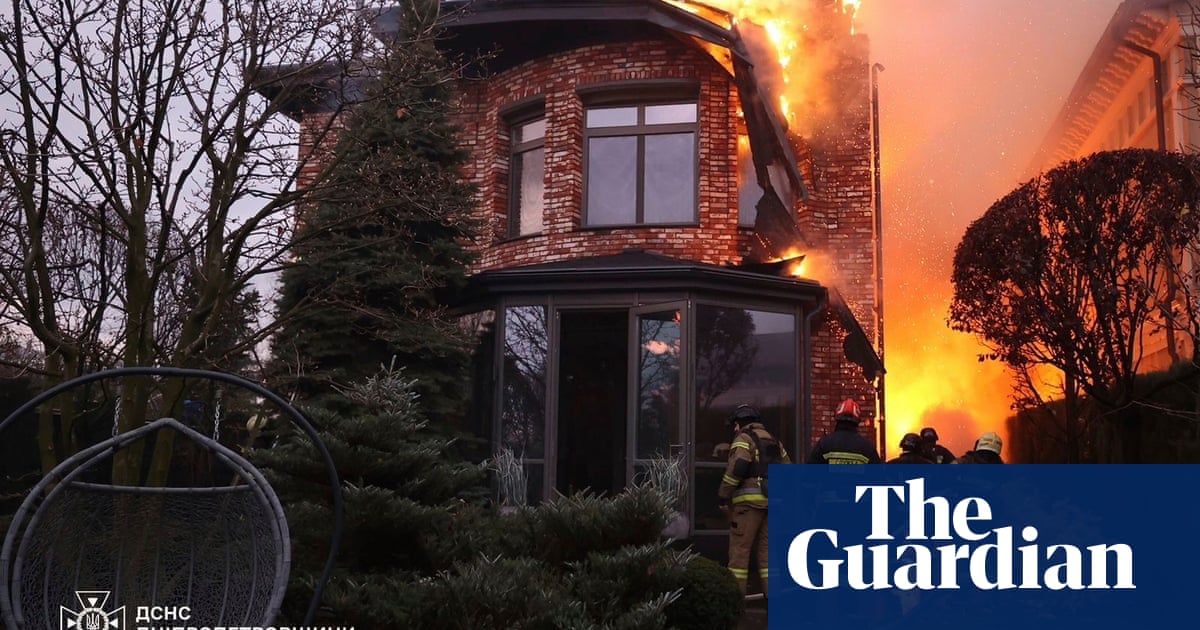Vladimir Putin has said Russia fired an experimental ballistic missile at a military site in the Ukrainian city of Dnipro on Thursday morning, and that Moscow “had the right” to strike western countries that provided Kyiv with weapons used against Russian targets.
The Russian president, speaking during an unannounced televised address to the nation, appeared to directly threaten the US and UK, who earlier this week allowed Ukraine to fire western-made Atacms and Storm Shadow missiles into Russia.
The new ballistic missile was called Oreshnik [the hazel], Putin said, and its deployment “was a response to US plans to produce and deploy intermediate and short-range missiles”. He said Russia would “respond decisively and symmetrically” in the event of an escalation.
“Russia reserves the right to use weapons against targets in countries that permit their weapons to be used against Russian targets,” Putin added, in his most explicit threat to attack western countries who have been providing military aid to Ukraine since Russia launched its full-scale invasion in February 2022.
US and UK sources indicated that they believed the missile fired on Dnipro was an experimental nuclear-capable, intermediate-range ballistic missile (IRBM), which has a theoretical range of below 3,420 miles (5,500km). That is enough to reach Europe from where it was fired in south-western Russia, but not the US.
Ukraine’s air force had initially claimed Russia had fired a longer-range intercontinental ballistic missile (ICBM). However, the president, Volodymyr Zelenskyy, later softened the claim to say the missile fired had “all the parameters” of an ICBM in terms of speed and altitude of flight.
“Obviously, Putin is using Ukraine as a testing ground. Obviously, Putin is terrified when normal life simply exists next to him,” Zelenskyy said. “When a country simply wants to be and has the right to be independent.”
In a statement published on Telegram, Zelenskyy later said the missile strike was “final proof that Russia definitely does not want peace”.
The missile was fired from the Astrakhan region of Russia, Ukraine’s air force said, meaning that it travelled about 500 miles to reach its target, as part of a wider salvo of nine missiles between 5am and 7am. Six of the missiles were intercepted by Ukraine’s air force but the new ballistic missile was not stopped.
Video of the incident from a distance showed the ground being struck in multiple flashes, though damage and casualty reports were modest. The missile was said to have hit “without consequences”, Ukraine’s air force said, though it added that complete information about victims had yet to be received.
Fabian Hoffmann, a doctoral research fellow at Oslo University who specialises in missile technology and nuclear strategy, said the significance of the Oreshnik missile strike was that it appeared to carry a type of payload that “is exclusively associated with nuclear-capable missiles”.
Ukraine used US Atacms missiles to target what it said was a weapons depot in Russia’s south-western Bryansk region on Monday, and fired a salvo of Storm Shadow missiles on Wednesday at a command post in Kursk, where Kyiv’s forces hold a small bridgehead of territory inside Russia.
Ukraine had previously used both weapons to strike targets inside its internationally recognised borders, but had been lobbying the US and UK for months to allow it to strike airfields, bases and depots deeper inside Russia.
Both sides are stepping up their military efforts in the near three-year-long war ahead of the inauguration of Donald Trump on 20 January. The Republican president-elect has said he wants to end the war, though it is unclear how he proposes to do so, and each side is hoping to improve its battlefield position before he takes office.
A US official told the Guardian that Russia had launched an “experimental intermediate-range ballistic missile” at Ukraine, of which Russia likely possesses only a “handful”. UK sources made similar comments and the weapon was described as having a range of a few thousand kilometres.
Russia is required by a treaty to inform the US of the launch of certain kinds of ballistic missiles, in the hopes of preventing an escalatory ladder that could lead to an all-out nuclear war.
A US official said Russia had “pre-notified” Washington of the launch before the attack in an attempt to prevent a retaliation – though Russia said it had only done so 30 minutes before through the US’s Nuclear Threat Reduction Center, according to the Kremlin spokesperson, Dmitry Peskov.
On Wednesday the US suddenly announced that its embassy in Kyiv would be closed that day after receiving warning of a “potential significant air attack” somewhere in Ukraine. No further details were provided and, after a nervous day in the Ukrainian capital, the embassy reopened.
The US official also told the Guardian that Russia may have used the weapon as an attempt to “intimidate Ukraine and its supporters” or attract public attention, but that the weapon would not be a “gamechanger” in the conflict. “Russia likely possesses only a handful of these experimental missiles,” the official said.
Earlier on Thursday, the Russian foreign ministry spokesperson, Maria Zakharova, appeared to inadvertently reveal some details about the early-morning strike during a live press briefing.
A hot mic captured Zakharova’s phone conversation with an unidentified caller who instructed her not to comment “on the ballistic missile strike”. Notably, the caller did not use the word intercontinental.
In the brief telephone exchange – footage of which remains available on the foreign ministry’s official account on X – the caller appears to disclose that the strike targeted the Yuzhmash military facility in Dnipro.

